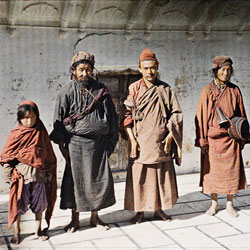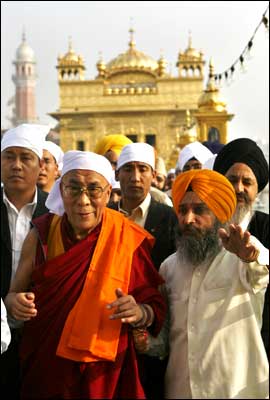Sikhism believes that there have been many Buddhas, and regards Buddha as an enlightened teacher.
ਆਖਹਿ ਗੋਪੀ ਤੈ ਗੋਵਿੰਦ ॥ The Gopis and Krishna speak.
ਆਖਹਿ ਈਸਰ ਆਖਹਿ ਸਿਧ ॥ Shiva speaks, the Siddhas speak.
ਆਖਹਿ ਕੇਤੇ ਕੀਤੇ
ਬੁਧ ॥ The many created
Buddhas speak.
ਆਖਹਿ ਦਾਨਵ ਆਖਹਿ ਦੇਵ ॥ The demons speak, the demi-gods speak.
ਆਖਹਿ ਸੁਰਿ ਨਰ ਮੁਨਿ ਜਨ ਸੇਵ ॥ The spiritual warriors, the heavenly beings, the silent sages, the humble and serviceful speak.
ਕੇਤੇ ਆਖਹਿ ਆਖਣਿ ਪਾਹਿ ॥ Many speak and try to describe Him.
ਕੇਤੇ ਕਹਿ ਕਹਿ ਉਠਿ ਉਠਿ ਜਾਹਿ ॥ Many have spoken of Him over and over again, and have then arisen and departed. -SGGS, page 6
Guru Nanak also went to Tibet. He travelled a lot. There are a few miracles and events attributed to him there. Sikhism, though, generally does not care for miracles and sees them as a distraction and liable to fraudsters, so I have no idea how well accepted these miracles are. I have seen some images of Tibetan lamas at the Golden Temple, though I cannot find them now, unfortunately. They aren't the easiest images to find, though, since Sikhism is not exactly a well-known religion and it suffers from misunderstandings.
The answer to your second question -- "are they more or less the same?" is, yes, they are very similar in some regards. Sikhism, however, is better described as panentheistic, as opposed to monotheistic; God within Sikhism is present in
everything and is non-different from us, as opposed to the conception of the God who is different from everything of, say, Sunni Islam, who is not present in creation.
Like Buddhism, Sikhism includes a concept of "illusion" (maya) that is the world. Like Buddhism, Sikhism speaks of "śūnyatā", known as "Void", or "Empty" -- but unlike Buddhism, "sunn" (Gurmukhī: ਸੁੰਨ

can also refer to God, as well as a state of pure samadhi and absorption into the Lord. Sikhism also speaks of Nirvana.
ਮਾਇਆ ਫਾਸ ਬੰਧ ਨਹੀ ਫਾਰੈ ਅਰੁ ਮਨ
ਸੁੰਨਿ ਨ ਲੂਕੇ ॥ The mortal does not break free from the bonds of the noose of
Maya, and he does not seek the shelter of the
profound, absolute Lord.
ਆਪਾ ਪਦੁ
ਨਿਰਬਾਣੁ ਨ ਚੀਨ੍ਹ੍ਹਿਆ ਇਨ ਬਿਧਿ ਅਭਿਉ ਨ ਚੂਕੇ ॥੨॥ He does not realize the dignity of the self, and
Nirvaanaa; because of this, his doubt does not depart. ||2|| - SGGS, page 475
ਘਟਿ ਘਟਿ
ਸੁੰਨ ਕਾ ਜਾਣੈ ਭੇਉ ॥ One who knows the mystery of
God the Absolute, who pervades each and every heart,
ਆਦਿ ਪੁਰਖੁ ਨਿਰੰਜਨ ਦੇਉ ॥ knows the Primal Being, the Immaculate Divine Lord. - SGGS, page 943
I think that's all the questions... did I miss anything?






